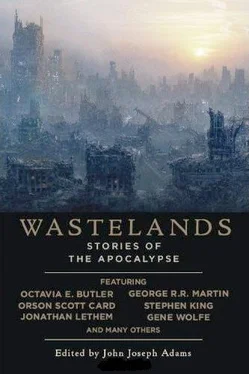The same old crap. I raise my eyebrows at him. He stares into the fire and says quietly, "To say Washington is rioting says nothing. You have to see a twelve-year-old hurl a homemade bomb, a man sliced open from neck to crotch because he still has a job to go to and his neighbour doesn’t, a three-year-old left to starve because someone abandoned her like an unwanted kitten…You don’t know. It doesn’t happen Inside."
"We’re better than they are," Rachel says. I look at my grandchild. She says it simply, without self-aggrandizement, but with a kind of wonder. In the firelight the thickened gray ropes of skin across her cheek glow dull maroon.
McHabe said, "Perhaps you are. I started to say earlier that we’ve learned that the virus doesn’t affect just the skin. It alters neurotransmitter receptor sites in the brain as well. It’s a relatively slow transformation, which is why the flurry of research in the early years of the disease missed it. But it’s real, as real as the faster site-capacity transformations brought about by, say, cocaine. Are you following me, Mrs. Pratt?"
I nod. Jennie and Rachel don’t look lost, although they don’t know any of this vocabulary, and I recognize that McHabe must have explained all this to them,
"As the disease progresses to the brain, the receptors which receive excitory transmitters slowly become harder to engage, and the receptors which receive inhibiting transmitters become easier to engage."
"You mean that we become stupider."
"Oh, no! Intelligence is not affected at all. The results are emotional and behavioural, not intellectual. You become-all of you-calmer. Disinclined to action or innovation. Mildly but definitely depressed."
The fire burns down. I pick up the poker, bent slightly where someone once tried to use it as a crowbar, and poke at the log, which is a perfectly shaped moulded-pulp synthetic stamped "Donated by Weyerhaeuser-Seyyed."
"I don’t feel depressed, young man."
"It’s a depression of the nervous system, but a new kind-without the hopelessness usually associated with clinical depression."
"I don’t believe you."
"Really? With all due courtesy, when was the last time you—or any of the older Block leaders—pushed for any significant change in how you do things Inside?"
"Sometimes things cannot be constructively changed. Only accepted. That’s not chemistry, its reality."
"Not Outside," McHabe says grimly. "Outside they don’t change constructively or accept. They get violent. Inside, you’ve had almost no violence since the early years, even when your resources tightened again and again. When was the last time you tasted butter, Mrs. Pratt, or smoked a cigarette, or had a new pair of jeans? Do you know what happens Outside when consumer goods become unavailable and there are no police in a given area? But Inside you just distribute whatever you have as fairly as you can, or make do without. No looting, no rioting, no cancerous envy. No one Outside knew why. Now we do."
"We have envy."
"But it doesn’t erupt into anger."
Each time one of us speaks, Jennie and Rachel turn their heads to watch, like rapt spectators at tennis. Which neither of them has ever seen. Jennie’s skin glows like pearl.
"Our young people aren’t violent either, and the disease hasn’t advanced very far in some of them."
"They learn how to behave from their elders-just like kids everywhere else."
"I don’t feel depressed."
"Do you feel energetic?"
"I have arthritis."
"That’s not what I mean."
"What do you mean, Doctor?"
Again that restless, furtive reach for a non-existent cigarette. But his voice is quiet. "How long did it take you to get around to applying that insecticide I got Rachel for the termites? She told me you forbid her to do it, and I think you were right; it’s dangerous stuff. How many days went by before you or your daughter spread it around?"
The chemical is still in its can.
"How much anger are you feeling now, Mrs. Pratt?" he goes on. "Because I think we understand each other, you and I, and that you guess now why I’m here. But you aren’t shouting or ordering me out of here or even telling me what you think of me. You’re listening, and you’re doing it calmly, and you’re accepting what I tell you even though you know what I want you to—"
The door opens and he breaks off. Mamie flounces in, followed by Peter. She scowls and stamps her foot. "Where were you, Rachel? We’ve been standing outside waiting for you all for ten minutes now! The dance has already started!"
"A few more minutes, Mama. We’re talking."
"Talking? About what? What’s going on?"
"Nothing," McHabe says. "I was just asking your mother some questions about life Inside. I’m sorry we took so long."
"You never ask me questions about life Inside. And besides, I want to dance!"
McHabe says, "If you and Peter want to go ahead, I’ll bring Rachel and Jen-me.
Mamie chews her bottom lip. I suddenly know that she wants to walk up the street to the dance between Peter and McHabe, an arm linked with each, the girls trailing behind. McHabe meets her eyes steadily.
"Well, if that’s what you want," she says pettishly. "Come on, Pete!" She closes the door hard.
I look at McHabe, unwilling to voice the question in front of Rachel, trusting him to know the argument I want to make. He does. "In clinical depression, there’s always been a small percentage for whom the illness is manifested not as passivity but as irritability. It may be the same. We don’t know."
"Gram," Rachel says, as if she can’t contain herself any longer, "he has a cure."
"For the skin manifestation only," McHabe says quickly, and I see that he wouldn’t have chosen to blurt it out that way. Not for the effects on the brain."
I say, despite myself, "How can you cure one without the other?"
He runs his hand through his hair. Thick, brown hair. I watch Jennie watch his hand. "Skin tissue and brain tissue aren’t alike, Mrs. Pratt. The virus reaches both the skin and the brain at the same time, but the changes to brain tissue, which is much more complex, take much longer to detect. And they can’t be reversed-nerve tissue is non-regenerative. If you cut your fingertip, it will eventually break down and replace the damaged cells to heal itself. Shit, if you’re young enough, you can grow an entire new fingertip. Something like that is what we think our cure will stimulate the skin to do.
"But if you damage your cortex, those cells are gone forever. And unless another part of the brain can learn to compensate, whatever behaviour those cells governed is also changed forever."
"Changed into depression, you mean."
"Into calmness. Into restraint of action…The country desperately needs restraint, Mrs. Pratt."
"And so you want to take some of us Outside, cure the skin ropes, and let the depression spread: the ‘restraint,’ the ‘slowness to act’…"
"We have enough action out there. And no one can control it—it’s all the wrong kind. What we need now is to slow everything down a little—before there’s nothing left to slow down."
"You’d infect a whole population—"
"Slowly. Gently. For their own good—"
"Is that up to you to decide?"
"Considering the alternative, yes. Because it works. The colonies work, despite all your deprivations. And they work because of the disease!"
"Each new case would have skin ropes—"
"Which we’ll then cure."
"Does your cure work, Doctor? Rachel’s father died of a cure like yours!"
"Not like ours," he says, and I hear in his voice the utter conviction of the young. Of the energetic. Of the Outside. "This is new, and medically completely different. This is the right strain."
"And you want me to try this new right strain as your guinea pig."
Читать дальше












